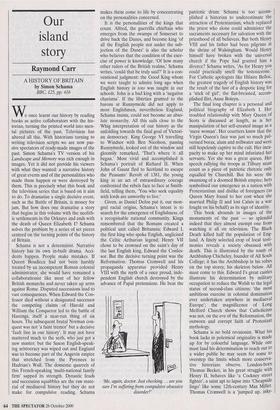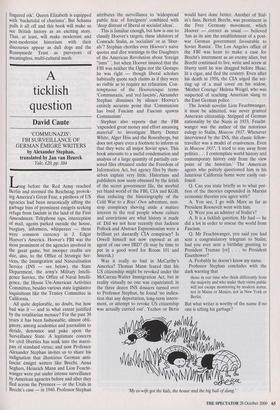Our island story
Raymond Carr
A HISTORY OF BRITAIN by Simon Schama BBC, f25, pp. 416 Wonce learnt our history by reading books as active collaborators with the his- torian, turning the printed world into men- tal pictures of the past. Television has altered all this. With historians turning to writing television scripts we are now pas- sive spectators of ready-made images of the past. Simon Schama's TV version of his Landscape and Memory was rich enough in images. Yet it did not provide his viewers with what they wanted: a narrative history of great events and of the personalities who made them happen or were destroyed by them. This is precisely what this book and the television series that is based on it aim to do. To dramatise a single decisive event, such as the Battle of Britain, is money for jam. But how does one dramatise a story that begins in this volume with the neolith- ic settlements in the Orkneys and ends with the death of Queen Elizabeth I? Schama solves the problem by a series of set pieces centred on the turning points of the history of Britain.
Schama is not a determinist. Narrative history has its own in-built drama. Acci- dents happen. People make mistakes. If Queen Boudicca had not been harshly treated by an incompetent Roman colonial administrator, she would have remained a collaborationist like most of her fellow British monarchs and never taken up arms against Rome. Disputed successions lead to vast consequences. When Edward the Con- fessor died without a designated successor the competing claims of Harold and William the Conqueror led to the battle of Hastings, itself a near-run thing of six hours. The subsequent brutal Norman con- quest was not 'a faint tremor' but a decisive `fault line in our history'. It may not have mattered much to the serfs, who just got a new master; but the Saxon English-speak- ing aristocracy was wiped out and England was to become part of the Angevin empire that stretched from the Pyrenees to Hadrian's Wall. The domestic quarrels of this French-speaking 'multi-national family firm' sapped its strength. Dynastic feuds and succession squabbles are the raw mate- rial of mediaeval history but they do not make for compulsive reading. Schama makes them come to life by concentrating on the personalities concerned.
It is the personalities of the kings that count. Alfred, the guerrilla chieftain who emerges from the swamps of Somerset to drive back the Danes, and become king 'of all the English people not under the sub- jection of the Danes' is also the scholar who believes that the condition of the exer- cise of power is knowledge. 'Of how many other rulers of the British realms,' Schama writes, 'could that be truly said?' It is a con- ventional judgment: the Good King whom we were taught to admire long ago when English history in toto was taught in our schools. John is a bad king with a 'negative charisma'. If the liberties granted to the barons at Runnymede did not apply to most Englishmen, nevertheless England, Schama insists, could not become an abso- lute monarchy. All this sails close to the Whig interpretation of our history as the unfolding towards the final goal of Victori- an democracy. King George VI travelling to Windsor with Ben Nicolson, passing Runnymede, looked out of the window and gloomily remarked, 'That's where it all began.' Most vivid and accomplished is Schama's portrait of Richard II. When John of Gaunt fled to Scotland to escape the Peasants' Revolt of 1381, the young king in an act of extraordinary courage confronted the rebels face to face at Smith- field, telling them, 'You who seek equality with lords arc unworthy to live.'
Given, as Daniel Defoe put it, our mon- grel racial origins, Schama's intent is to search for the emergence of Englishness, of a recognisable national community. Kings remembered that the Romans created a political unit called Britannia; Edward I, the first king who spoke English, anglicised the Celtic Arthurian legend; Henry VII chose to be crowned on the saint's day of the last English king, Edward the Confes- sor. But the decisive turning point was the Reformation. Thomas Cromwell and his propaganda apparatus provided Henry VIII with the myth of a once proud, inde- pendent English church destroyed by the advance of Papal pretensions. He beat the `Me, again, doctor. Just checking. • are you sure I'm suffering from compulsive obsessive disorder?' patriotic drum. Schama is too accom- plished a historian to underestimate the attraction of Protestantism, which replaced the priest who alone could administer the sacraments necessary for salvation with the priesthood of all believers. But both Henry VIII and his father had been pilgrims at the shrine of Walsingham. Would Henry himself have broken with the universal church if the Pope had granted him a divorce? Schama writes, 'As for Henry you could practically smell the testosterone.' For Catholic apologists like Hilaire Belloc, the greatest tragedy of English history was the result of the lust of a despotic king for a 'stick of girl', the flat-breasted, accom- plished flirt, Anne Boleyn. The final long chapter is a personal and political biography of Elizabeth I. Her troubled relationship with Mary Queen of Scots is discussed at length, as is her manipulation of her self-created image as a `mere woman'. Her courtiers knew that the Virgin Queen's face was just so much pul- verised borax, alum and millwater and were still hopelessly captive to the cult. Her inca- pacity to make up her mind infuriated her servants. Yet she was a great queen. Her speech rallying the troops at Tilbury must count as a piece of patriotic rhetoric only equalled by Churchill. But his were the swansong of a doomed British empire; hers symbolised our emergence as a nation with Protestantism and dislike of foreigners (as Queen Mary found to her cost when she married Philip II and lost Calais in a war fought on his behalf) as its sign of identity. This book abounds in images of the monuments of the past — so splendid indeed that they almost exempt one from watching it all on television. The Black Death killed half the population of Eng- land. A finely selected crop of local testi- monies reveals a society obsessed with death. This is illustrated by the tomb of Archbishop Chicheley, founder of All Souls College; it has the Archbishop in his robes on the top storey, his skeleton below. All must come to this. Edward I's great castles illustrate his determination by military occupation to reduce the Welsh to the legal status of second-class citizens; 'the most ambitious exercise in colonial domination ever undertaken anywhere in mediaeval Europe'; the magnificence of Long Melford Church shows that Catholicism was not, on the eve of the Reformation, the outworn and corrupt faith of Protestant mythology. Schama is no bold revisionist. What his book lacks in polemical originality is made up for by colourful language. While one must laud his determination to reach out to a wider public he may seem for some to overstep the limits which more conserva- tive historians observe. London-born Thomas Becket, in his great struggle with Henry II, behaves like 'a Cockney street fighter', a saint apt to lapse into `Cheapside lingo' like some 12th-century Max Miller. Thomas Cromwell is a 'jumped up, inky-
fingered oik'. Queen Elizabeth is equipped with 'bucketsful of charisma'. But Schama pulls it all off and this book will make us see British history as an exciting story. That, at least, will make modernist and post-modernist historians with their discourses appear as dull dogs and the Runnymede Trust as purveyors of meaningless, multi-cultural mush.



























































































 Previous page
Previous page